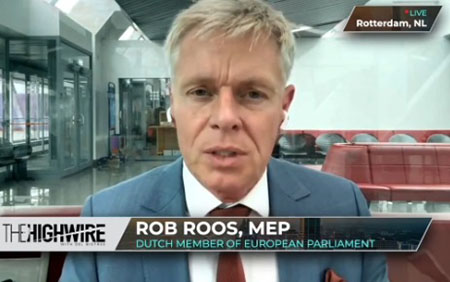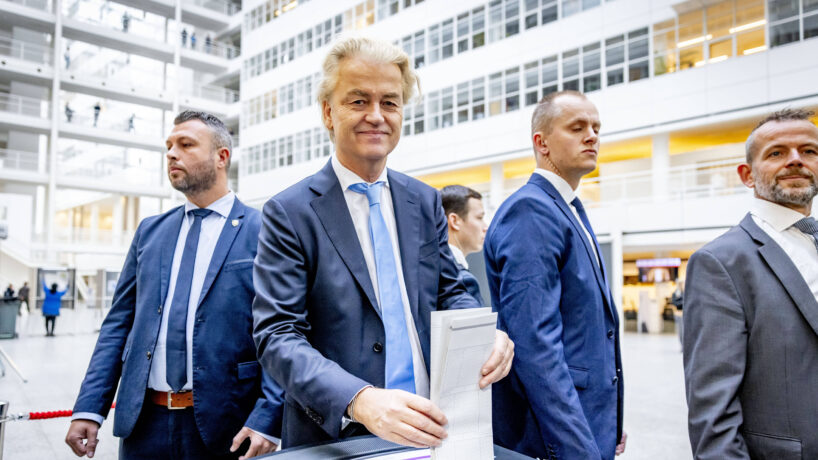



Closed-door negotiations have reportedly broken a deadlock in forming a new Dutch government. The negotiations, which took place behind closed doors, involved four political parties: the People's Party for Freedom and Democracy (VVD), the Christian Democratic Appeal (CDA), Democrats 66 (D66), and the Christian Union (CU). The talks were aimed at forming a coalition government after the March 2021 parliamentary elections. The negotiations lasted for over 200 days, making it the longest government formation process in Dutch history. The breakthrough in the negotiations came after the parties reached an agreement on key policy issues, including climate change, healthcare, and income inequality. The next step in the process is for the parties to present their agreement to their respective party members for approval. If approved, the new government could be formed in the coming weeks.
Geert Wilders, the far-right leader of the PVV party in the Netherlands, will not become the prime minister after his prospective coalition partners blocked his path. However, as the leader of the largest party in parliament, Wilders will still have power and influence [aa86820d].
Wilders' victory in the Dutch elections is part of a broader trend of right-wing populism across Europe. The rise of far-right parties in Europe, including the recent emergence of the BoerBurgerBeweging and Nieuw Sociaal Contract in the Netherlands, suggests a potential alliance with Wilders. This election result reflects a growing trend of right-wing populism in Europe, with similar movements gaining ground in France, Italy, Germany, and Sweden [7972e172].
The rise of far-right parties could lead to an 'extreme right moment' in the upcoming European elections, with projections indicating that far-right forces could gain 180 seats in the European Parliament next year. Wilders is aligned with Marine Le Pen and Matteo Salvini in the Identity and Democracy group, which is the most Eurosceptic and far-right group in the European Parliament. The presence of far-right leaders in the European Council will likely impact decision-making and weaken the European Union. These parties are often opposed to fundamental rights such as abortion and may challenge reproductive rights. Additionally, their presence could affect migration and climate policies, as far-right parties are known for their anti-immigration stance and skepticism towards climate action [7972e172].
In an analysis piece, Ties Dams argues that although Wilders won't become prime minister, he will still have power and influence as the leader of the largest party in parliament. Wilders' politics have always been about European identity rather than national identity. He has attacked EU policies on Israel, opposed Turkey joining the EU, campaigned against the adoption of the EU constitution, and made high-profile attacks on Islam. Dams emphasizes the need to challenge Wilders' counter-narrative and confront his myths with the pluralist and democratic narrative of the European Union to protect Europe against internal division and external threats [aa86820d].
The business community in the Netherlands is demanding stability and consistency as they await the outcome of coalition talks. Wilders' victory has raised concerns about the business environment and the potential risks it may pose. The Netherlands has benefited from the UK's departure from the EU, with Amsterdam's financial center overtaking London as a share trading venue. The country's thriving technology sector relies on attracting skilled workers from abroad, and companies emphasize the importance of maintaining access to international talent. While bond and equity markets have remained relatively stable, there is uncertainty about whether Wilders will be able to govern and how his more extreme positions might be moderated in a coalition government. Business associations and entrepreneurs are calling for stability and improvements in the investment climate, including steps on housing and regulation. There are concerns about the potential hindrance to the growth of Dutch firms and the tech industry if immigration laws are tightened. The average tech employee tends to be more progressive, making headlines about the far right and anti-Islam sentiments off-putting. It is crucial for the Dutch government to address these concerns and provide reassurances to the business community. Stability and consistency are key for businesses to thrive and continue attracting international talent. The outcome of coalition talks will be closely watched as it will determine the direction of the country's policies and its impact on the business environment [7972e172].
A new Dutch political party participating in the 2024 European Parliament elections received a donation from an organization affiliated with the Chinese Communist Party (CCP). The party, NL Plan, is also linked to Chinese-Dutch groups and individuals who have ties with the CCP. NL Plan promotes strong ties between the EU and China and wants to push back on the 'enormous anti-Chinese rhetoric that has emerged in European politics'. NL Plan has received money from an overseas unit affiliated with China’s United Front Work Department (UFWD), a department of the Central Committee of the CCP. Experts say the Netherlands should take measures to define and counter foreign electoral interference [fbd78205].
Dutch Member of European Parliament Rob Roos warns about the global elite ruling class's plan to control food and trade under the guise of climate change. He explains the six ways the bureaucrats and centralists in Brussels gain power, including using and abusing crises, controlling CO2 emissions, simulating democracy with NGOs, supplanting national law with EU law, and changing treaties. Roos calls for conservatives to unite and take back the educational system, culture, and economy to stop the globalists [a9a64b21].